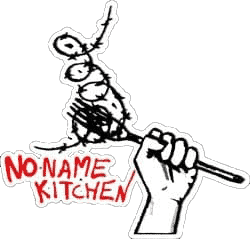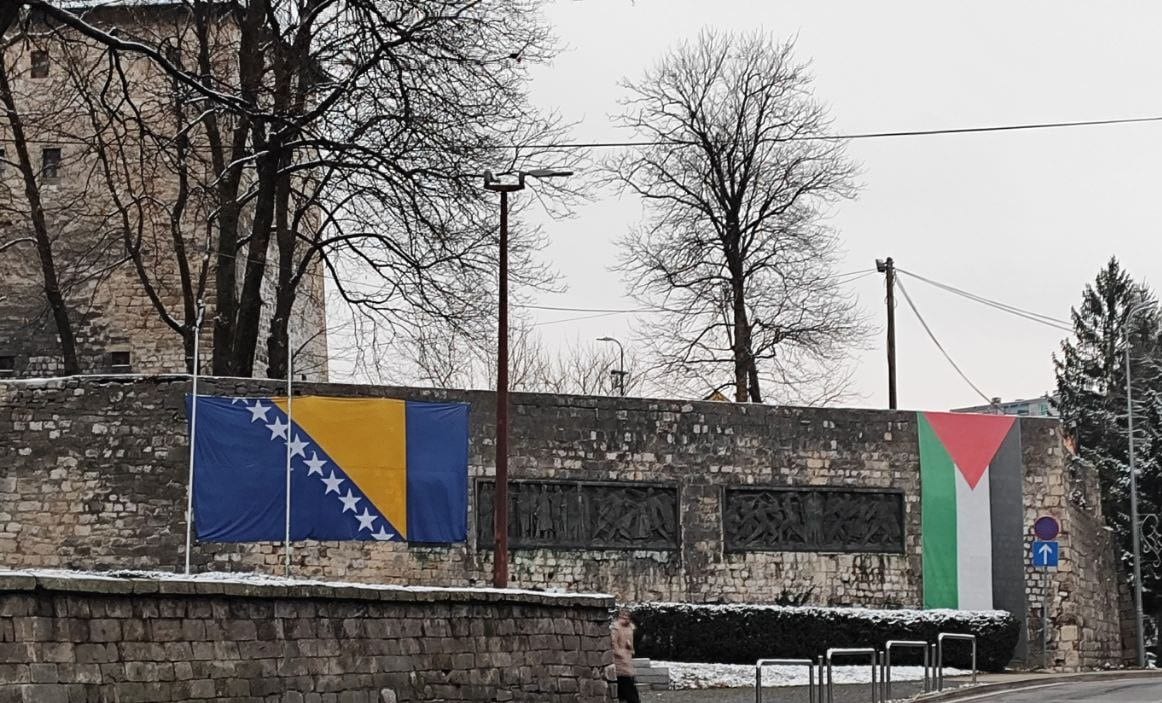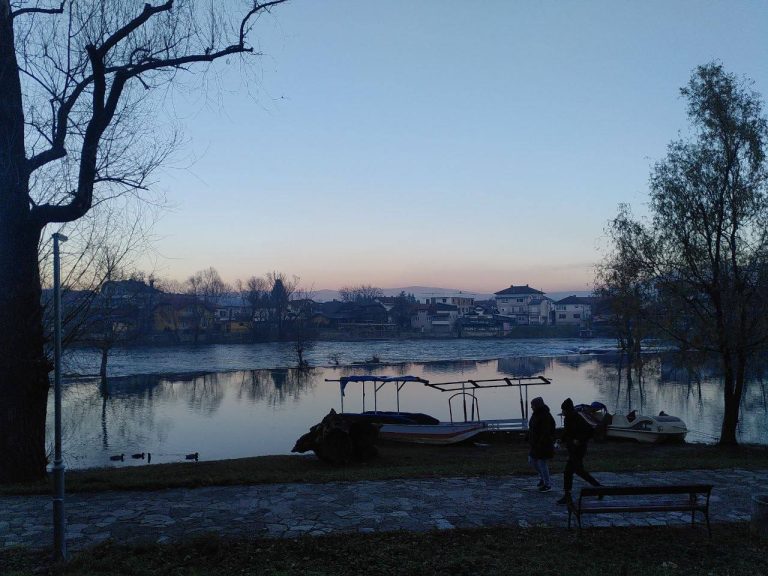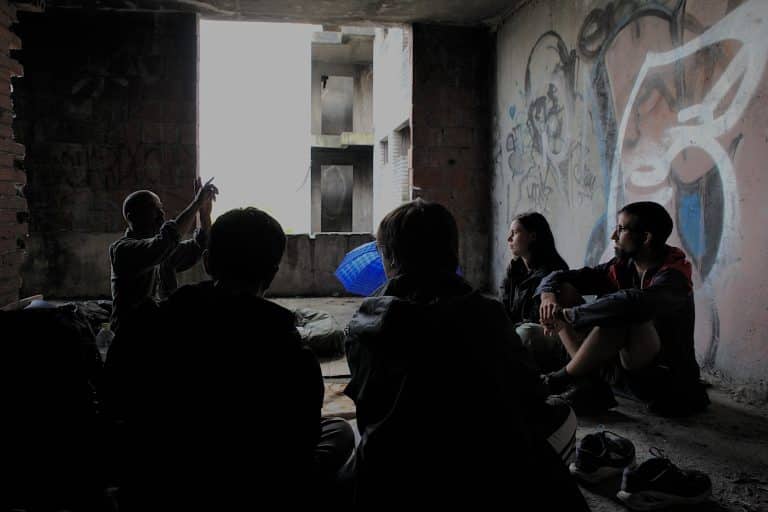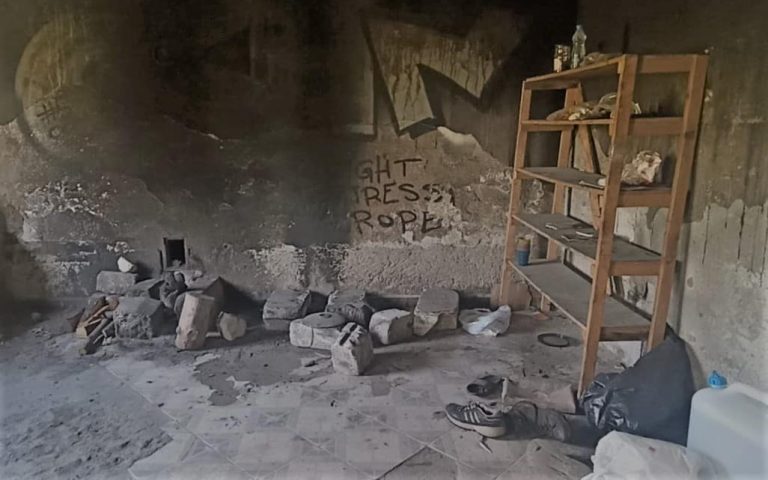By Masa Nazzal as part of No Name Kitchen. Pictures by Masa Nazzal.
It is a bizarre feeling to meet one of your own people on the field, at the EU borders. I am here in Bihać, Bosnia working on the field with NNK. And while here I have met many Palestinians. I am a second generation Palestinian, my family history has been drenched with forced movement and migration across countries and continents. That is part of the reason I have come here to do this work. I have been blessed with a life of safety in the west, but I can not say the same about my own family and my own people.
While here I have met many Palestinains on the move. I have met Palestinians who, like my own family, have been living in diaspora since the 1948 Nakba, the catastrophic event that displaced hundreds of thousands of Palestinains from their homeland. Within their stories, are lived experiences of multiple forced migrations. First forced to leave Palestine in 1948, then now I see my fellow Palestinains in another movement, forced to leave their temporary homes of Syria, Egypt, Lebanon, or Jordan for another life that is void of poverty and war.
*Here you can also find all the article in Bosnian / Serbian / Croatian language. English continue below:
A few weeks ago I met a man named Sadam, he is Palestinian but born in Syria, like my parents. Not only that, but his origins were from the same Palestinian village as my ancestors, Safad.
There is a moment of celebration when I find out we are from the same place, but quickly it sinks to the realisation that my grandparents and his experienced the same forced exodus in 1948, yet our lives and positions couldn’t be more different.
He is in the midst of another forced migration, while I have the luxury of an American passport. The only thing that separates my privileged position as a westernised Palestinians to their liminal position is luck (and my father’s migration).
Even amongst this liminal reality that people exist within, have seen in them an immense capacity to persevere in a world system that is unjust and violent towards them. In the face of the injustice and precarity in which they live, they still remain steadfast in their optimism and hope for a better future. They still believe that there is more to life than the immediate reality of being on the move and more to life than the situation and place they were born in. This radical hope reminds me of my family in Palestine and my family in the diaspora. No matter how far away the reality of freedom feels, we nonetheless hope.
Our hope is our steadfastness, it is the mountain that cannot be moved. We hope to live, but more so we hope so we can dream. To dream of a day when we can return, to hope for the day that the injustices that have been etched into our ancestry be cleansed. We hope and hope and hope. Nothing moves borders more than hope. Nothing crumbles a zionist regime like hope. Nothing and nobody can become free without hope. Hope is revolutionary. Never forget that.
Solidarity and Empathy to Palestine

I am thankful to share language, laughs, and stories with my fellow friends. But most of all, I am thankful to share this strong sense of solidarity with them. Every person I have met while at the borders, no matter where they are from, have expressed a strong sense of solidarity and empathy towards me when I tell them I am Palestinian.
Many people take moments of their emotional capacity to feel for me, to feel for my people, even as they are in positions so precarious beyond belief. I came here to give solidarity, and did not expect to receive it in such abundance. That is the testament to the characters, heart and soul of the people I have met. Their ability to reverse this solidarity has given me my own space to process this immense collective grief over Palestine. For that I am eternally grateful.
As I grieve, I work. As must we all. Until freedom comes. For us and for all.
I have been on the field for two months, within these months my own people have been suffering a war and genocide. I am Palestinian, but I am far from my people and homeland. Far from the fight. Far from my family who is stuck under military occupation and nightly invasions.
I woke up the morning of December 4th doing what I usually do, check my phone for the updates on Gaza. More death, more destruction. Nothing seems to be slowing down the Israel genocidal war machine. My brain can no longer wrap around the extent of these deaths. The 20000+ people, the 8000+ children. Entire infrastructures of society stomped to the ground by iron missiles.
As I continued to scroll on Al-Jazeera’s live updates I saw the news of more deaths and raids in the West Bank. More specifically, in Qalqilya, where my entire fathers side of the family lives. I quickly called my aunt who lives there to try to understand what was happening.
She explained that early in the morning another member of my family was martyred by the Israeli army, Alaa Nazzal, along with another young man, Anas Qaraqe. They were in a car when soldiers opened fire on them, killing them instantly.
A global game
A bit over a month ago another cousin was murdered by the Israel regime, his name was Hamza Nazzal, and like all the rest of the 256+++ people killed in the West Bank, and the thousands upon thousands killed in Gaza since Oct 7, there was no justification for their deaths. Only the strike of violence. A verdict declared with Israel’s jurisdiction, a verdict declared by the bullet, a verdict declared by the coward in soldiers’ uniforms. That same year, Europe was the second largest receiver of Israel defence goods, totalling 29% of purchases. These items consist of drones, unmanned aerial vehicles, air defence systems, radar and electronic warfare systems. We have already received reports of these technologies being used against people on the move along the Croatian borders.
On the flip side, Germany with 24% and Italy with 5.9% are the two largest exporters of arms to Israel after the USA, from 2011 to 2020, with Germany sending €682 million worth of arms and Italy sending €342 million.
Since October 7th, EU countries like Germany and Italy have supplied Israel with F-35 jets, guided bombs, tanks, and submarines. These are the weapons of genocide that we are being used now in Gaza. As of November 2nd Germany has now approved arms trade exports worth €303 million to Israel.
It is the same hand of violence that commits the atrocities in Palestine, that is also happening here along the EU borders. The EU and Israel work hand and hand to commit the violent acts that I am seeing on the field in Bosnia/Croatia, as my aunt is seeing there, in Palestine.
The EU has granted 5.6 billion euros for 2021-2027 to Frontex. A mafia style public military service that controls and violates bodies along the borders. These equipment they use are supplied by the IDF, Israeli Defense Force, whose government’s arms export totaled to $12.5 billion in 2022.
Both the EU and Israel use their vast military resources to control populations as to prohibit movement, security, safety, or freedom. These resources are used to kill. This past month, 4 Moroccan men died while trying to cross to Croatia. They died of the cold, but moreover they died because the EU has yet to provide any safe and legal passage for people on the move. So their option is to try to fight against the changing climate to cross before it’s too late.
This is not an isolated incident, the past month we have gotten reports of people on the move dying while trying to pass through the river into Slovenia, dying of illness, dying of hunger. We have gotten dozens of inquiries of people on the move who have gone missing while trying to move through the borders. These deaths are Europe’s deaths, even as they choose to take a blind eye towards the violence they commit.
As a team we went to the graveyard here in Bihać, in the back etched into a corner on a slope was a small section of graves with wooden markings painted green. These graves are of the unidentified people on the move who have died in transit. Lost and never returned. I wonder about their families, the questions they have over their lost loved ones, the answers they will never know. I wonder who they were. I fear thinking of their last moments. I cry over their lost identity.
Europe has stripped them of life. We will not forget that.
